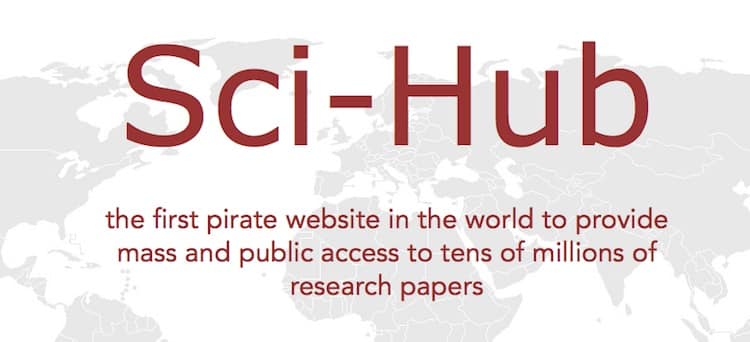It’s not every day that one of the world’s largest publishing companies is awarded $15 million in damages for copyright infringement against a site set up by a Kazakh neuroscientist. That makes the almost total lack of wider coverage of Elsevier’s win in New York against Sci-Hub surprising. But it is only the latest development in a saga that is of great interest for the deep flaws it exposes in both scientific publishing and copyright itself.
The court awarded $15 million damages to the scientific publisher on the basis of 100 articles published by Elsevier that had been made available without permission on Sci-Hub and a similar site called LibGen. At the time of writing, Sci-Hub claims to hold 62 million scientific research papers – probably a majority of all those ever published – most of which are unauthorized copies. According to a report in the scientific journal Science last year, it is Elsevier which is most affected by Sci-Hub’s activities:
“Over the 6 months leading up to March [2016], Sci-Hub served up 28 million documents. More than 2.6 million download requests came from Iran, 3.4 million from India, and 4.4 million from China. The papers cover every scientific topic, from obscure physics experiments published decades ago to the latest breakthroughs in biotechnology. The publisher with the most requested Sci-Hub articles? It is Elsevier by a long shot – Sci-Hub provided half-a-million downloads of Elsevier papers in one recent week.”
Those figures help to explain why Elsevier has been pursuing Sci-Hub doggedly for some years. Back in December 2015, the same New York judge who has just awarded the $15 million to Elsevier issued a preliminary injunction against the site’s operator. Access to the original domain – sci-hub.org – was suspended, but it carried on using a different domain. Its servers, meanwhile, remain beyond the reach of US law, since they are located in Russia. In the age of VPNs, attempts to block the site are similarly pointless.
This might seem to be an ordinary cat-and-mouse story of a pirate site being pursued by affected copyright holders, and evading various legal moves to shut it down. But there’s an important difference here.
Most of the papers published by Elsevier and the other academic publishing houses and found on Sci-Hub were written by scientists and academics whose research grants were paid for by the public. Once written those papers were submitted to a relevant journal, where an editor or editorial board chose which ones should be considered for publication. To that end, the papers were passed to referees who scrutinized them as part of the peer review system, whereby fellow academics read the text, and judge whether it deserves to be published as is, or needs revisions and corrections. Typically, neither editorial boards nor peer reviewers are paid for their work, which is carried out as a kind of academic responsibility accepted by all as part of the job, and done for the greater good of society.
That is, most of the work writing, checking and editing a paper is carried out completely for free. The only costs that academic publishers incur are typically for production, which are limited if publication is purely digital, as is increasingly the case. Given the extremely efficient nature of the academic publishing system, it will come as no surprise to learn that leading companies in the sector – including Elsevier – have consistently achieved profit margins between 30% and 40%, levels almost unheard of in other industries.
Such elevated profit margins have come as the prices paid by academic libraries to subscribe to titles have increased rapidly. While the cost of living increased by 73% between 1986 and 2004, the expenditure by research libraries on subscriptions to academic journals went up by 273% in the same period. The trend has continued since then. This is not because academic libraries have been given larger budgets. On the contrary, they are finding it harder and harder to pay exorbitant subscription costs because of what is known as the “serials crisis”, and are often forced to drop some titles.
It was this inability to access key academic papers that prompted the neuroscience researcher Alexandra Elbakyan, who was born in Kazakhstan, to set up Sci-Hub in 2011. As she explained in a submission to the New York judge hearing the Elsevier case against her:
“When I was a student in Kazakhstan university, I did not have access to any research papers. These papers I needed for my research project. Payment of 32 dollars [the typical cost to access one paper] is just insane when you need to skim or read tens or hundreds of these papers to do research. I obtained these papers by pirating them. Later I found there are lots and lots of researchers (not even students, but university researchers) just like me, especially in developing countries. They created online communities (forums) to solve this problem. I was an active participant in one of such communities in Russia. Here anyone who needs research paper, but cannot pay for it, could place a request and other members who can obtain the paper will send it for free by email. I could obtain any paper by pirating it, so I solved many requests and people always were very grateful for my help. After that, I created sci-hub.org website that simply makes this process automatic and the website immediately became popular.”
Although the judge was unmoved by Elbakyan’s argument, academics around the world have flocked to her site. And not just from countries unable to afford expensive subscriptions. As the 2016 research published in Science revealed, users in the US were then collectively the fifth largest group of downloaders, and some of the most intense Sci-Hub users are to be found at US and European universities.
In part, that’s probably because Sci-Hub is much easier to use than most academic libraries, which require complex sign-on procedures, and restrictive license agreements. But another reason seems to be a common feeling among researchers that all this knowledge should be freely available on a site like Sci-Hub. After all, most of the work was paid for by the public, so it seems wrong that libraries and individuals must pay again to read the papers.
The reason why Elsevier and other academic publishing houses are able to claim copyright for papers written by others is because the authors are persuaded to assign licenses that let publishers sue on their behalf, whether or not the researchers would agree. As one of the most perceptive observers of this world, Richard Poynder, pointed out recently in an important essay, academic publishers have effectively weaponized copyright. They are able to extract extremely high levels of profit, with widespread access to the knowledge they publish relegated to a secondary consideration, and there is little researchers can do about it.
It seems unlikely that Elsevier will ever see any of the $15 million awarded by the court – Sci-Hub is run on a shoestring, and other than a few servers probably has no resources worth seizing. However, that has not stopped the American Chemical Society filing its own suit against Sci-Hub this week, although it is not clear what it hopes to achieve by doing so. While Russia refuses to enforce US courts’ rulings, Elbakyan is probably safe from extradition – although wisely she keeps her physical location a secret.
The fact that a global academic publishing company could be awarded millions in damages against someone trying to help other scientists to spread and access publicly-funded knowledge – exactly as science is supposed to work – is an indication of how broken copyright is today. Until that massive problem is fixed, Sci-Hub will remain what one leading academic called a “necessary, effective civil disobedience“.
About Glyn Moody
Glyn Moody is a freelance journalist who writes and speaks about privacy, surveillance, digital rights, open source, copyright, patents and general policy issues involving digital technology. He started covering the business use of the Internet in 1994, and wrote the first mainstream feature about Linux, which appeared in Wired in August 1997. His book, “Rebel Code,” is the first and only detailed history of the rise of open source, while his subsequent work, “The Digital Code of Life,” explores bioinformatics – the intersection of computing with genomics.
Read also
Open access: All human knowledge is there—so why can’t everybody access it?
We paid for the research with taxes, and Internet sharing is easy. What’s the hold-up?










